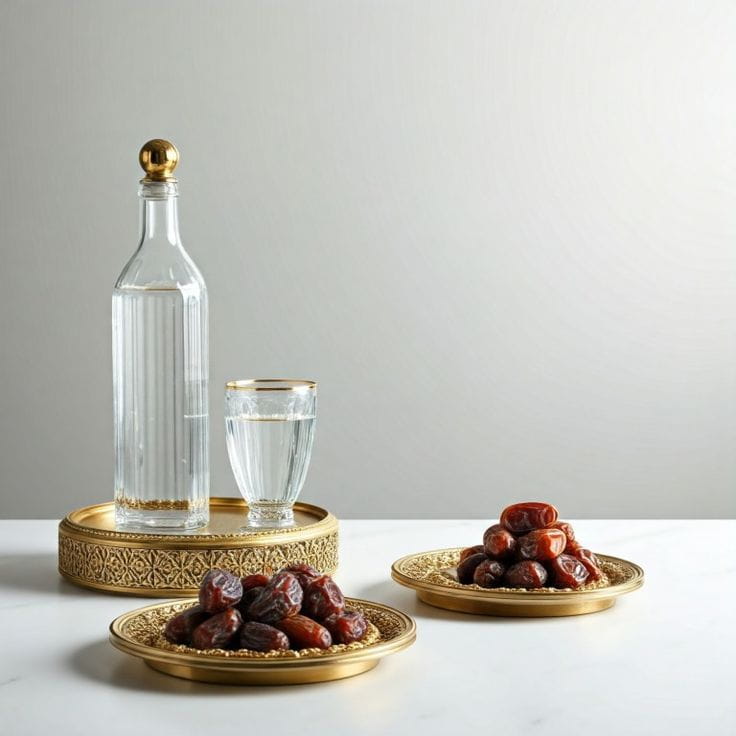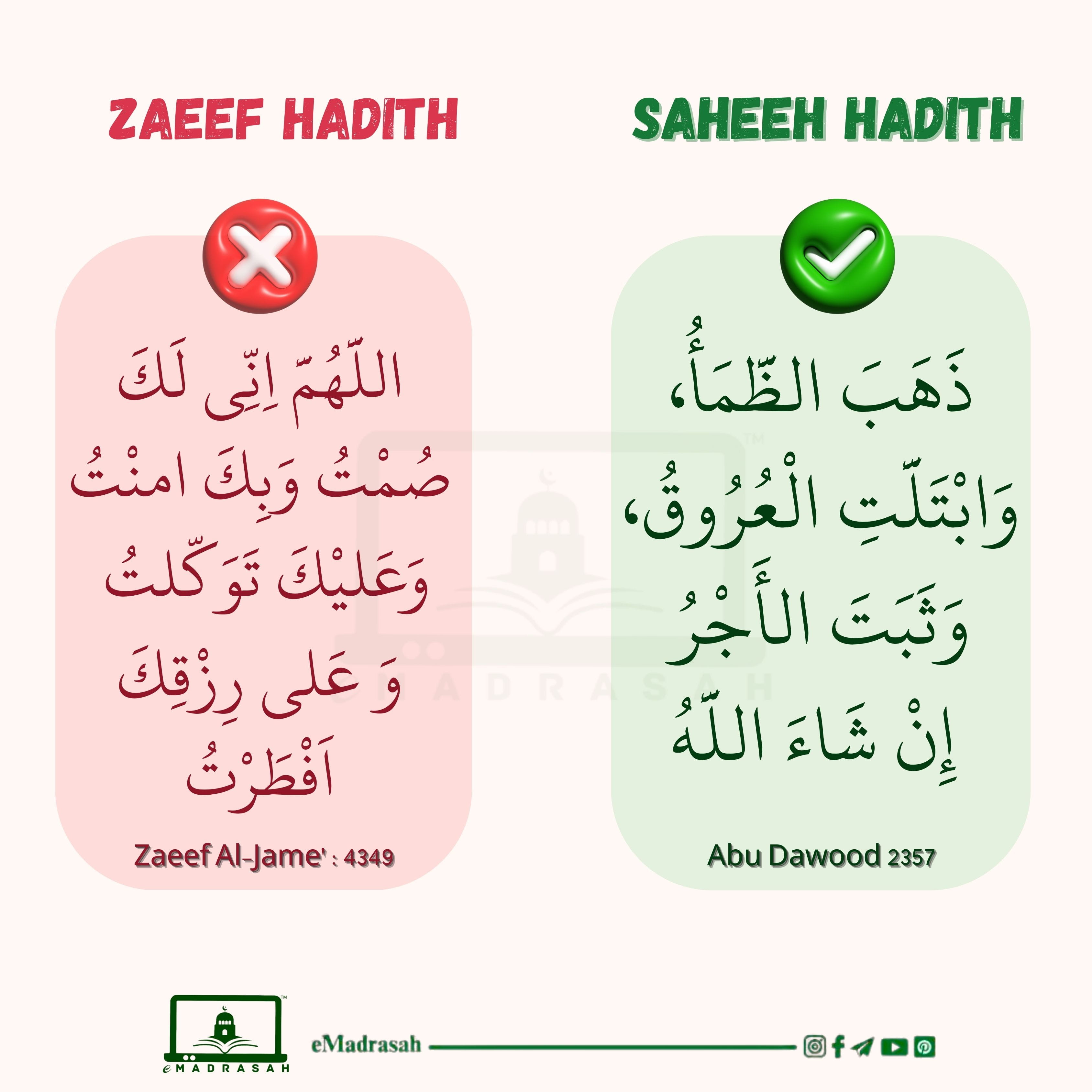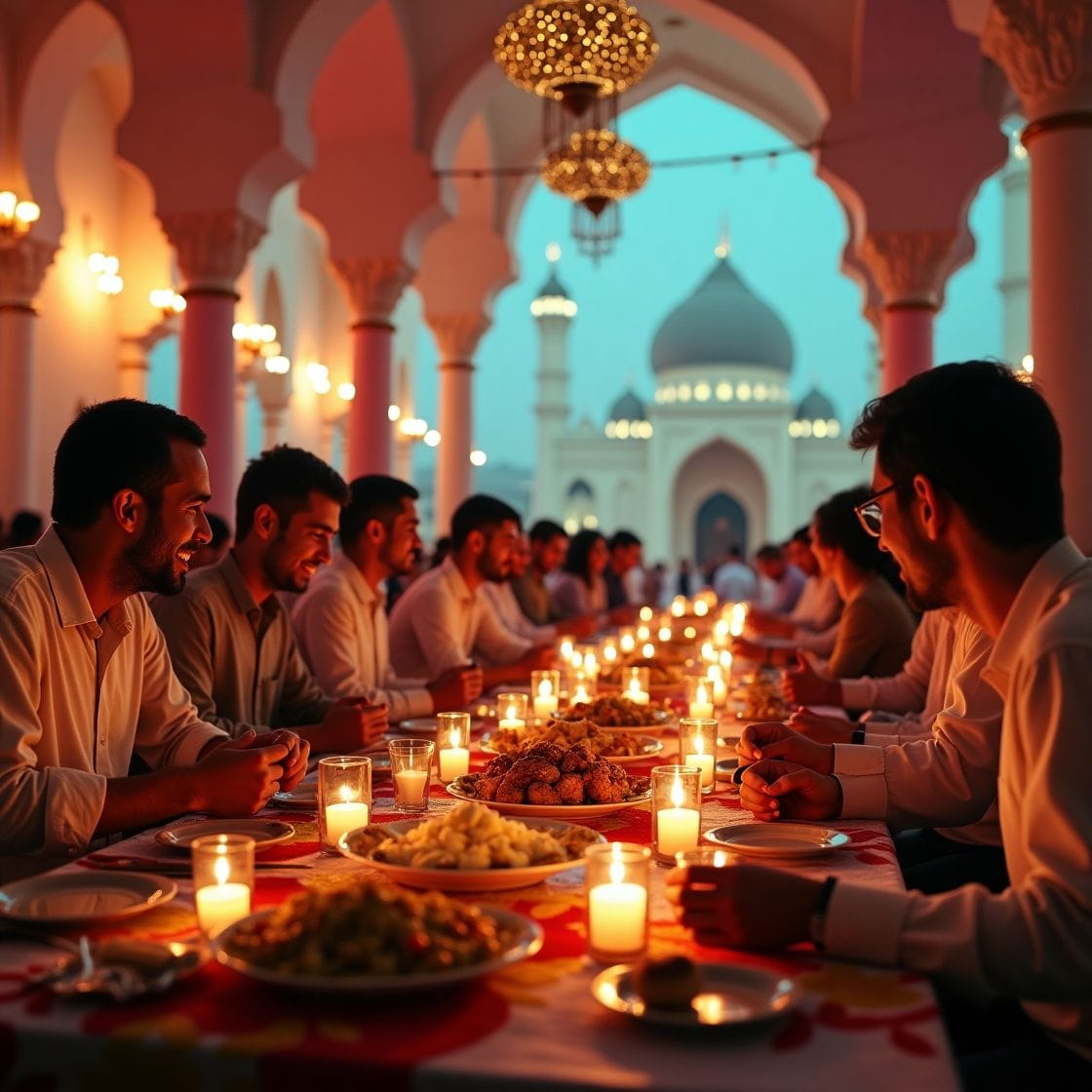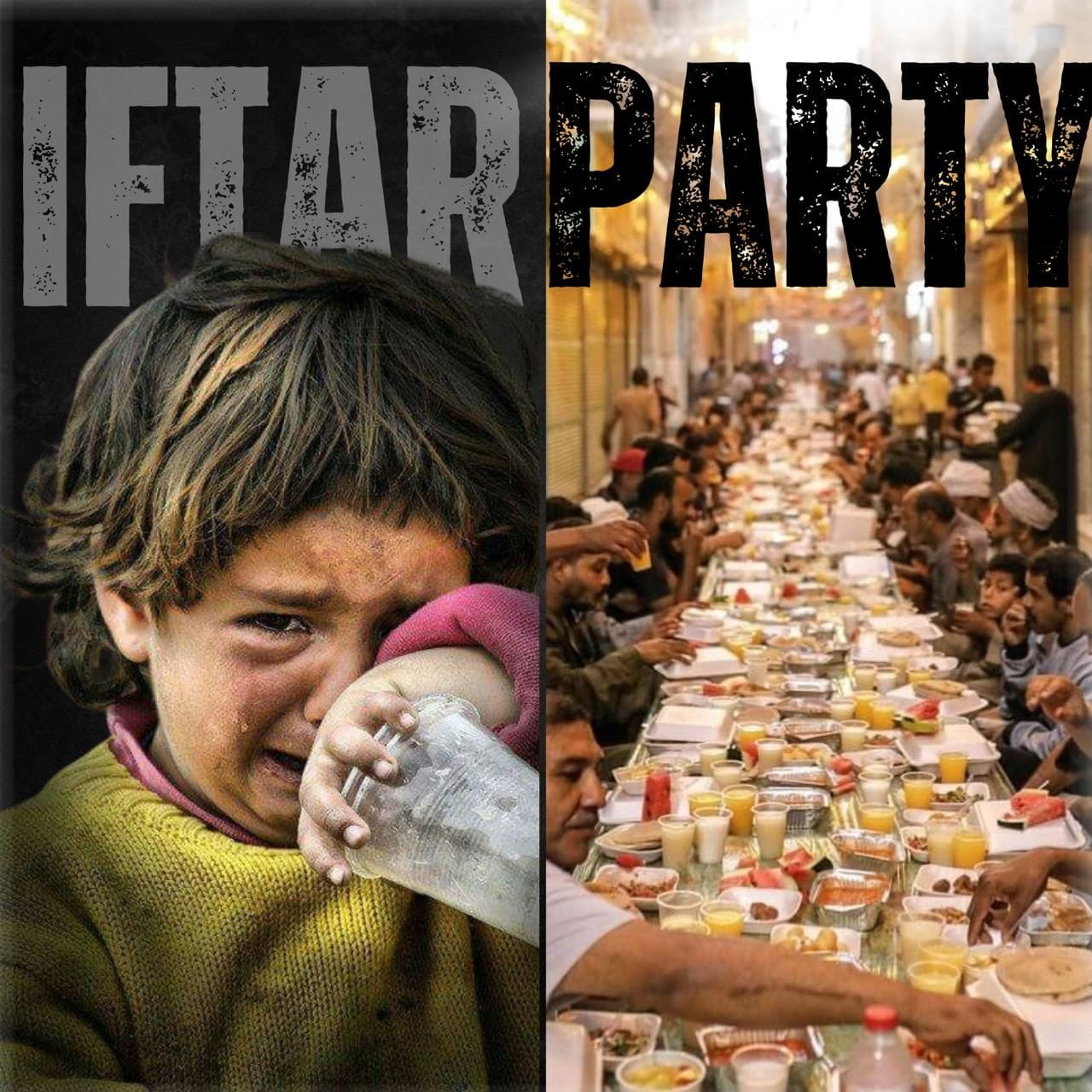ETIQUETTES OF IFTAR


The time of breaking the fast is when the sun sets; the moment when the fatigue of fasting is replaced by the promise of reward. The fasting person has spent the entire day abstaining from food, drink and other physical desires solely for the pleasure of Allah. Now, as they take their first bite, they are filled with gratitude, relief, and spiritual fulfillment. The Prophet Muhammad (ﷺ) beautifully described the joy of breaking the fast:
للصَّائم فرحتان: فرحةٌ عندَ فطره، وفرحةٌ عندَ لقاء ربِّه
"The fasting person experiences two joys: joy when breaking the fast and joy when meeting their Lord."
(Sahih Bukhari: 1904, Sahih Muslim: 1151)
The first joy is natural and instinctive. The happiness of relieving hunger and thirst after a long day of fasting. Islam does not suppress this natural inclination but rather celebrates it. Islam distinguishes itself from rigid ascetic traditions that glorify self-inflicted suffering. While some faiths promote extreme fasting, self-mortification or lifelong renunciation of worldly joys, Islam strikes a harmonious balance. The Prophet ﷺ institutionalized Eid Ul-Fitr as a day of gratitude and celebration, marking the successful completion of Ramadan’s spiritual training (See: Surah Al-Baqarah: 2:185). The second joy, however, is far greater; the joy of meeting Allah on the Day of Judgment and receiving the eternal reward for fasting.
What to have for Iftar?
كان رسول الله - صلى الله عليه وسلم - يفطر على رُطَبَاتٍ قبل أن يصلي، فإن لم يكن رطبات فتمرات، فإن لم يكن تمرات حسا حسواتٍ من ماء
"The Messenger of Allah (ﷺ) would break his fast with fresh dates before praying. If there were no fresh dates, he would eat dried dates. If there were no dates, he would take a few sips of water."
(Musnad Ahmad: 12265, Sunan Abu Daud: 2356, Sunan Tirmizi: 696)
Fasting empties the stomach. Thus, the gradual introduction of nourishment, first with dates, then water, allows the digestive system, especially the liver, to adjust smoothly. Fresh dates, with their natural sweetness, are rapidly absorbed and provide immediate energy; if unavailable, dried dates serve a similar purpose, and water cools the stomach, preparing it for the main meal. Modern nutritionists confirm that gradually reintroducing food into the stomach after prolonged fasting is the healthiest approach.

Hastening to Iftar
An important etiquette of Iftar is to not delay it unnecessarily, once the eastern horizon darkens. The correct way to determine the time of Iftar is by observing the beginning of the disappearance of daylight at the eastern horizon. Once this darkness begins to rise and extends toward the point where the true dawn (Fajr as-Sadiq) originates, it serves as a clear indication that the sun has set. It is not necessary for the darkness to reach the midpoint of the sky for Iftar. As soon as the darkness becomes visible in the east, marking the departure of daylight, a fasting person should immediately break their fast without unnecessary delay. Delaying Iftar beyond this moment is contrary to the Sunnah. The Prophet (ﷺ) elucidated this by saying:
إِذَا أَقْبَلَ اللَّيْلُ مِنْ هَاهُنَا، وَأَدْبَرَ النَّهَارُ مِنْ هَاهُنَا، وَغَرَبَتِ الشَّمْسُ، فَقَدْ أَفْطَرَ الصَّائِمُ
"When the night begins from this direction (the east), and the day departs from this direction (the west), and the sun has set, then the fasting person has broken their fast."
(Sahih Bukhari: 1954, Sahih Muslim: 1100)
Unnecessarily delaying iftar, just to be cautious (Ihteyaat) is not a part of our Sharia'h. Islam is based on the clear teachings of the Quran and the Sunnah, not unnecessary doubt or hesitation. The obedience to the Prophet ﷺ should always be prioritized over personal opinions and assumptions.
Let's take a look at the next Hadith of Sahih Muslim to elaborate more on the Sunnah of the Messenger ﷺ.
كُنَّا مع رَسولِ اللَّهِ صَلَّى اللهُ عليه وسلَّمَ في سَفَرٍ وهو صَائِمٌ، فَلَمَّا غَرَبَتِ الشَّمْسُ قَالَ لِبَعْضِ القَوْمِ: يا فُلَانُ، قُمْ فَاجْدَحْ لَنَا، فَقَالَ: يا رَسولَ اللَّهِ، لو أمْسَيْتَ، قَالَ: انْزِلْ فَاجْدَحْ لَنَا، قَالَ: يا رَسولَ اللَّهِ، فلوْ أمْسَيْتَ، قَالَ: انْزِلْ فَاجْدَحْ لَنَا، قَالَ: إنَّ عَلَيْكَ نَهَارًا، قَالَ: انْزِلْ فَاجْدَحْ لَنَا، فَنَزَلَ فَجَدَحَ لهمْ، فَشَرِبَ النَّبيُّ صَلَّى اللهُ عليه وسلَّمَ، ثُمَّ قَالَ: إذَا رَأَيْتُمُ اللَّيْلَ قدْ أقْبَلَ مِن هَاهُنَا، فقَدْ أفْطَرَ الصَّائِمُ.
Abdullah ibn Abu Awfa (Radhi Allahu Anhu) narrated: "We were with the Messenger of Allah (ﷺ) on a journey while he was fasting. When the sun set, the Prophet ﷺ said to a man, 'O so-and-so, get down and prepare something for us (a kind of juice made with the mixture of barley, milk or water).' Upon this the man replied, 'O Messenger of Allah ﷺ, let there be dusk.' The Prophet ﷺ said again, 'Get down and prepare it for us.' The man repeated, 'O Messenger of Allah, if only you would wait a little longer until it is truly evening.' The Prophet ﷺ repeated his instruction a third time, but the man still hesitated and said, 'The day is not over yet.' Finally, the Prophet ﷺ said, 'Get down and prepare it for us.' So the man did as commanded, and the Prophet ﷺ drank. Then the Prophet ﷺ said, 'When you see the night approaching from this direction (the east), the fasting person should break their fast.'"
(Sahih Bukhari: 1955, Sahih Muslim: 1101)
The companion in this narration was hesitant to break the fast immediately, believing that waiting a little longer would be safer because the sky was still too bright but the Prophet ﷺ insisted on breaking the fast as soon as the sun starts to set; the darkness approaches from the east and the daylight disappears to the west. The Prophet Muhammad ﷺ emphasized:
لَا يَزَالُ النَّاسُ بِخَيْرٍ مَا تَعَجَّلُوا الْفِطْرَ
"People will continue to be upon goodness as long as they hasten in breaking the fast."
(Sahih al-Bukhari: 1957, Sahih Muslim: 1098)
Hastening to iftar is a sign of following the Sunnah and distinguishing oneself from other religious traditions. The Jews and Christians were known to delay breaking their fasts until the appearance of stars. We should break our fast immediately at sunset to maintain the distinction of the Muslim Ummah, as taught by the Messenger of Allah (ﷺ ). The Prophet Muhammad ﷺ said:
لَا تَزَالُ أُمَّتِي عَلَى سُنَّتِي مَا لَمْ تَنْتَظِرْ بِفِطْرِهَا النُّجُومَ
"My Ummah will continue to follow my Sunnah as long as they do not wait for the stars to break their fast."
(Sahih Ibn Khuzaima: 2061)
Aisha (Radhi Allahu Anha) was once asked about two companions of the Prophet ﷺ, one who hastened in breaking the fast and one who delayed it. She said about one who hastened:
كَذَاكَ كَانَ يَصْنَعُ رَسُولُ اللَّهِ صَلَّى اللَّهُ عَلَيْهِ وَسَلَّمَ
"That is how the Messenger of Allah (ﷺ) used to do it."
(Sahih Muslim: 1099)

Having Iftar before the scheduled time
While hastening to Iftar is a Sunnah, breaking the fast before the scheduled time is a sin because not breaking the fast on time is an act which reflects disobedience to the command of Allah. The Prophet (ﷺ) was shown in a dream that severe punishment is prescribed for those who intentionally break their fast before the proper time: Abu Umamah al-Bahili (Radhi Allahu Anhu) reported that he heard from the Messenger of Allah ﷺ narrating:
بَيْنَا أَنَا نَائِمٌ، إِذْ أَتَانِي رَجُلَانِ فَأَخَذَا بِضَبْعَيَّ فَأَتَيَا بِي جَبَلًا وَعْرًا، فَقَالَا: اصْعَدْ، فَقُلْتُ: إِنِّي لَا أُطِيقُهُ، فَقَالَا: إِنَّا سَنُسَهِّلُهُ لَكَ، فَصَعِدْتُ، حَتَّى إِذَا كُنْتُ فِي سَوَاءِ الْجَبَلِ، إِذَا بِأَصْوَاتٍ شَدِيدَةٍ، فَقُلْتُ: مَا هَذِهِ الْأَصْوَاتُ؟ قَالُوا: هَذَا عُوَاءُ أَهْلِ النَّارِ، ثُمَّ انْطَلَقَ بِي فَإِذَا أَنَا بِقَوْمٍ مُعَلَّقِينَ بِعَرَاقِيبِهِمْ، مُشَقَّقَةٍ أَشْدَاقُهُمْ، تَسِيلُ أَشْدَاقُهُمْ دَمًا، فَقُلْتُ: مَنْ هَؤُلَاءِ؟ قَالُوا: هَؤُلَاءِ الَّذِينَ يُفْطِرُونَ قَبْلَ تَحِلَّةِ صَوْمِهِمْ
"I saw in a dream two men take me to a high mountain, and they said: 'Climb it!' I said, 'I cannot.' They said, 'We will help you.' When I reached the top, I heard terrible screams. I asked, 'What are these sounds?' They said, 'These are the cries of the people of Hell.' Then I was taken to a group of people hanging upside down with their mouths torn and bleeding. I asked, 'Who are these people?' They said, 'These are the ones who broke their fast before it was due.'"
(Sahih Ibn Khuzaymah: 1986)
Hanging upside down reflects the reversal of natural order, just as they violated the actual order of fasting. Their mouths being torn and bleeding signifies the misuse of their tongues and mouths for consuming food and drink unlawfully.
Dear readers, ponder! If this is the fate of those who break their fasts before time, how vicious will be the fate of those unfortunate people who do not fast during the month of Ramadan at all!
Dua and Iftar
The Prophet Muhammad ﷺ emphasized the importance of making Duas during fasting, particularly at the time of Iftar, as it is one of the times when prayers are most likely to be answered. One of the greatest virtues of fasting, as told by Allah's Messenger ﷺ, is that the supplication of a fasting person is never rejected by Allah. Subhanallah!
Hazrat Abu Hurairah (Radhi Allahu Anhu) narrated:
قُلنا يا رسولَ اللَّهِ: ما لَنا إذا كنَّا عندَكَ رقَّت قلوبُنا، وزَهِدنا في الدُّنيا، وَكُنَّا من أَهْلِ الآخرةِ، فإذا خَرجنا من عِندِكَ فآنَسنا أَهالينا، وشَمِمنا أولادَنا أنكَرنا أنفسَنا فقالَ رسولُ اللَّهِ صلَّى اللَّهُ علَيهِ وسلَّمَ: لو أنَّكم تَكونونَ إذا خرجتُمْ من عندي كنتُمْ على حالِكُم ذلِكَ لزارتْكمُ الملائِكَةُ في بيوتِكُم، ولو لم تُذنِبوا لجاءَ اللَّهُ بخَلقٍ جديدٍ كي يُذنِبوا فيغفرَ لَهُم قالَ: قلتُ يا رسولَ اللَّهِ ممَّ خُلِقَ الخلقُ؟ قالَ: منَ الماءِ، قلتُ: الجنَّةُ ما بناؤُها؟ قالَ: لبِنةٌ من فضَّةٍ ولبنةٌ من ذَهَبٍ، وملاطُها المسكُ الأذفرُ، وحصباؤُها اللُّؤلؤُ والياقوتُ، وتُربتُها الزَّعفرانُ مَن دخلَها ينعَمُ ولا يبأسُ، ويخلدُ ولا يموتُ، لا تبلَى ثيابُهُم، ولا يفنى شَبابُهُم ثمَّ قالَ: ثلاثٌ لا تُرَدُّ دعوتُهُم، الإمامُ العادلُ، والصَّائمُ حينَ يُفطرُ، ودعوةُ المظلومِ يرفعُها فوقَ الغمامِ، وتُفتَّحُ لَها أبوابُ السَّماءِ، ويقولُ الرَّبُّ تبارك وتعالى: وعزَّتي لأنصرنَّكِ ولو بعدَ حينٍ.
Abu Hurairah narrated: We said: "O Messenger of Allah! Why is it that when we are with you, our hearts become softened, and we feel free of desire for this world, and we are as the people of the Hereafter? But when we depart from you and socialize with our families and our children, we do not recognize ourselves (as in, we feel changed)?" So the Messenger of Allah ﷺ said: "If you were to remain in that condition when you depart from me, the angels would surely visit you in your houses. And if you did not sin, Allah would surely bring forth a new creation who would sin, so that He may then forgive them." He said: I said: "O Messenger of Allah! From what was creation made?" He said: "From water." We said: "What is Paradise constructed of?" He said: "Bricks of silver and bricks of gold. Its mortar is musk of a strong fragrance, its pebbles are pearls and rubies, and its earth is saffron. Whoever enters it shall live and shall not suffer, and shall feel joy, never experiencing sorrow. They will remain there eternally without ever dying. Their garments will never wear out, and their youth will never fade." Then he said: "Three people whose supplication is never rejected: The just ruler, the fasting person when he breaks his fast, and the supplication of an oppressed person. It is raised above the clouds, and the gates of Heaven are opened for it. And the Lord, Blessed and Exalted, says: 'I will surely help you, even if after some time.’"
(Sunan Tirmizi: 2525)

Dua for Iftar
At the moment of breaking the fast, the Prophet ﷺ would recite a specific supplication. The beautiful dua is as follows:
ذَهَبَ الظَّمَأُ وَابْتَلَّتِ الْعُرُوقُ وَثَبَتَ الْأَجْرُ إِنْ شَاءَ اللَّهُ
Zahaba zama'u wabtallatil-'uruqu wa thabatal-ajru in shaa'a Allah
"The thirst has gone, the veins are moistened, and the reward is confirmed, if Allah wills."
(Sunan Abu Daud: 2357)
Although there is another widely known Dua:
اللَّهُمَّ لَكَ صُمْتُ وَعَلَى رِزْقِكَ أَفْطَرْتُ
(O Allah, for You I have fasted, and upon Your sustenance, I break my fast)
(Sunan Abu Daud: 2358/ Dhaeef)
The chain of narration for this dua is weak, the attribution of this Dua to the Prophet ﷺ is not proven by any narration. Therefore, it is recommended we recite the first Dua, which is a sunnah and also has a better meaning.

What should we say before we start with our Iftar?
Before consuming any food including iftar, one should begin by mentioning the name of Allah (i.e. Bismillah), because all sustenance comes from Allah, and consuming it with His name invites blessings (Barakah). The Prophet ﷺ instructed:
إِنَّ اللَّهَ لَيَرْضَى عَنِ الْعَبْدِ أَنْ يَأْكُلَ الْأَكْلَةَ فَيَحْمَدَ اللَّهَ عَلَيْهَا، وَيَشْرَبَ الشَّرْبَةَ فَيَحْمَدَ اللَّهَ عَلَيْهَا
"Indeed, Allah is pleased with a servant who eats a meal and praises Allah for it, and drinks a drink and praises Allah for it."
(Sahih Muslim: 2734)
The Prophet ﷺ has taught us another Dua, in case a person forgets to say Bismillah before eating:
إِذَا أَكَلَ أَحَدُكُمْ فَلْيَذْكُرِ اسْمَ اللَّهِ تَعَالَى، فَإِنْ نَسِيَ أَنْ يَذْكُرَ اسْمَ اللَّهِ تَعَالَى فِي أَوَّلِهِ، فَلْيَقُلْ: بِسْمِ اللَّهِ فِي أَوَّلِهِ وَآخِرِهِ
"If any of you eat, let him mention the name of Allah. If he forgets to do so at the beginning, let him say: 'Bismillah fi awwalihi wa aakhirihi' (In the name of Allah at its beginning and end).”
(Sunan Abu Daud: 3767, Sunan Tirmizi: 1858)
After finishing the meal, we should thank Allah and read the Dua for Iftar at the end.
Virtues of Shared Iftar
One of the most beautiful aspects of Ramadan is the opportunity that this month provides for families and communities to come together in ibadah as a whole. Hence, breaking the fast collectively, instead of individually, holds immense benefits. When an entire group gathers for Iftar, it strengthens the bonds of love and mutual care among them. The available food, though limited it may be, suffices for all when shared and brings barakah. Initially, the Iftar may appear to be insufficient, but when people come together to share what they have, Allah’s blessings multiply the sustenance, making it enough for all. Additionally, it prevents wastage. The Messenger of Allah (ﷺ ) has emphasized upon the barakah of food which is shared among many by saying:
طَعَامُ الْوَاحِدِ يَكْفِي الاثْنَيْنِ، وَطَعَامُ الاثْنَيْنِ يَكْفِي الْأَرْبَعَةَ، وَطَعَامُ الْأَرْبَعَةِ يَكْفِي الثَّمَانِيَةَ
"The food of one person is sufficient for two, the food of two is sufficient for four, and the food of four is sufficient for eight."
(Sahih Muslim: 2059)
Inviting People to Iftar
Providing Iftar to a fasting person is one of the greatest acts of charity. It is an opportunity to earn the reward equivalent to that of a fasting person, while the fasting person’s reward remains intact. The Prophet ﷺ has said:
مَنْ فَطَّرَ صَائِمًا أَوْ جَهَّزَ غَازِيًا فَلَهُ مِثْلُ أَجْرِهِ
"Whoever provides iftaar to a fasting person or equips a warrior (for battle), he will receive the same reward as them."
(Jame' Sagheer: 8871)
Iftar 'Parties'
Unfortunately, nowadays the spiritual essence of iftaar gatherings is often lost. The emphasis is more on the 'party' aspect than the 'Iftar' itself, particularly those hosted by influential individuals or organizations, which has turned into a mere social or political spectacle. The focus shifts from earning Allah’s pleasure to seeking the recognition of prominent personalities. The true essence of Ramadan is overshadowed by extravagance and superficial exhibition. People are often found preoccupied with taking photographs, engaging in formalities, and seeking media attention. The Prophet ﷺ has warned against this kind of incorrect intention:
إِنَّمَا الأَعْمَالُ بِالنِّيَّاتِ
"Actions are judged by intentions."
(Sahih Bukhari: 1)

The Worst Iftar Gathering
Another unfortunate trend in modern iftar events is the exclusion of the less fortunate. Lavish feasts are arranged for the wealthy and influential, while the poor and needy are often forgotten. However, Islam teaches us to prioritize the underprivileged. This is evident in the rulings related to Eid Ul-Fitr, where the concept of Sadaqatul-Fitr ensures that the poor can also partake in the joy of the festival. Likewise, in Eidul-Adha, a portion of the sacrifice is recommended for the poor. The Prophet ﷺ has also emphasized the inclusion of the poor in walimah (marriage feasts), stating:
شَرُّ الطَّعَامِ طَعَامُ الْوَلِيمَةِ يُدْعَى لَهَا الأَغْنِيَاءُ وَيُتْرَكُ الْفُقَرَاءُ
"The worst food is the food of a Walimah to which only the rich are invited while the poor are left out."
(Sahih Bukhari: 5177)
The same principle is applied to iftar gatherings. If the poor are left out from such 'parties' then they are the worst Iftar.

What can be done in Iftar Gatherings?
Iftar gatherings should be conducted with sincerity (Ikhlas), including the less fortunate. The preparation of a number of various dishes for Iftar is against the spirit of fasting. It also burdens the household, particularly women, who may become over occupied with cooking and neglect their worship. Simplicity in preparation and moderation in food consumption should be our focus because a variety of dishes and overeating leads to physical discomfort and laziness in worship and Qiyamul Lail. It also leads to health issues such as bloating, indigestion, and sluggishness. Many people, after an entire day of fasting, tend to overeat at Iftar, which contradicts the essence of self-discipline and God-consciousness (Taqwa). The Prophet ﷺ has cursed a person who overeats by saying:
مَا مَلَأَ آدَمِيٌّ وِعَاءً شَرًّا مِنْ بَطْنٍ، فَإِنْ كَانَ لا بُدَّ فَاعِلاً فَثُلُثٌ لِطَعَامِهِ، وَثُلُثٌ لِشَرَابِهِ، وَثُلُثٌ لِنَفَسِهِ
"The son of Adam fills no vessel worse than his stomach. It is sufficient for a person to eat what keeps them upright. But if they must eat more, then one-third for food, one-third for drink, and one-third for air."
(Sunan Tirmizi: 2380)
May Allah grant us the wisdom to uphold the true values of Ramadan and allow us to benefit fully from its countless blessings.
Ameen.